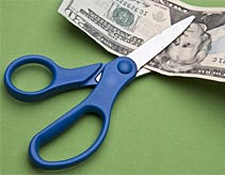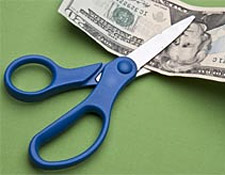
 Losing a job can devastate your finances. To keep yourself on an even keel, commit yourself to a self-help program of cutting expenses while you’re out hunting for a new job. Identify which of your expenses are “wants” and which are “needs.” Prioritize, and decide which “wants” to reduce or eliminate. Here’s some specific tips.
Losing a job can devastate your finances. To keep yourself on an even keel, commit yourself to a self-help program of cutting expenses while you’re out hunting for a new job. Identify which of your expenses are “wants” and which are “needs.” Prioritize, and decide which “wants” to reduce or eliminate. Here’s some specific tips.
Tip #1: Get Your Unemployment (and Other) Benefits
Go to your local unemployment office right away and file for benefits. Apply for food stamps. Find out what food distribution programs there are in your community. If you have children in school, seek out the free or reduced-price programs for breakfast and lunch.
Tip #2: Rectify Your Credit Card Balances
If you cannot make the minimum monthly payment, transfer any balances to credit cards that charge lower interest rates. Find out the toll-free phone number to call for help from each of your credit card companies, and call and explain your current situation — write down all the details of the conversation, including who you are talking to. Do not ever take out tax refund loans or payday loans.
Tip #3: Reduce Your Housing Costs
If you have a mortgage, call up your lender about re-negotiating your mortgage. If you rent, see if you fit the requirements for reduced-cost housing or rental assistance in your community. Pull out your home insurance and see what quotes you get from four other insurance brokers for the same coverage. If you have to move out of your home because you cannot afford the cost, check with extended family to see if you might trade chores or house upkeep for a place to stay.
Tip #4: Reduce Your Health Costs
Buy over-the-counter drug equivalents or generic drugs instead of brand-name prescriptions. If you had health insurance from your employer while you were employed, check into the Federal COBRA health insurance program. Go to reduced-fee or free clinics or to dental and medical schools for medical treatment.
Tip #5: Control Your Food Costs
Stay away from convenience stores — shop at the grocery stores that give you the best prices, and even then, comparison shop for the lowest price. When grocery shopping, work from a list you wrote beforehand. Buy bulk, generic or store brand items. Stop eating out and pack lunches when you’re out for the day.
Tip #6: Pick Your Bank Wisely
If you’re not already doing so, keep your accounts at a credit union or bank that does not charge fees. Find out how to qualify for free checking. If you have ownership equity in your home, see if your bank will grant you a home equity loan.
Tip #7: Lower Your Home Utility Cost
Whether it’s telephone service, cable or electric/gas supplies, call the provider to find out if you can switch to basic service or a less costly plan. Turn off lights and electrical items in rooms no one is using. Turn down the temperature setting on your hot water heater. Use the cold-water setting on your washer and hang the wet clothes to dry.
Tip #8: Lower Your Transportation Costs
Avoid using your car for most trips — ride a bike, walk or use public transportation instead. Plan ahead of time for any car trips and combine errands. Save money on your car by comparing gas prices, keeping your tires at the correct inflation, and driving more slowly. For car insurance, comparison shop among several insurers — keep the deductible high. Know the comparison between liability and full coverage when shopping for car insurance. It’s important to know your options, so you can pick the right coverage for your needs. For example, most states require liability insurance, meaning you probably already have it. However, if you drive often, full coverage (comprehensive plus collision insurance) is best because it protects you and other drivers. Drop coverage for collision on any older car you own.
Tip #9: Organize Your Taxes
File your Federal and State income tax returns to get any refundable tax credits, such as the Earned Income Credit or the Child Tax Credit. VITA is a community program available nationwide to help people file their tax returns for free — check locally for other resources or try free tax prep.
Tip #10: Liquidate Your Valuables
Look around the house, garage and yard to see what you have that you can sell for cash. It’s not just the big items, like boats and RVs, that will help you out — broken gold jewelry might be a source of cash. Perhaps you can set up a weekly garage sale in your driveway to get rid of your old books, DVD’s and CD’s.
Tip #11: Find Free Recreation
You don’t have to pay a lot to enjoy yourself or relax. Visit your community’s public parks, museums and playgrounds. Take a look at that calendar of events for your church or at your children’s school. Your local public library provides books, newspapers, magazines, movies, music, and access to the Internet.
Tip #12: Do It Yourself
Stop paying for services — do it yourself. Mow the lawn. Change the oil in your car. Wash your car. Do your own laundry and ironing. Do your own nails. If there’s some task that’s simply beyond you, trade services with someone else in the neighborhood.
Tip #13: Cut Back on Gifts and Donations
As much as you’d like to continue feeling charitable, at this time you cannot afford it. Give time and effort to your church rather than money. Make your personal gifts for others rather than buying them.
Tip #14: Find Part-Time Work
Take a part-time job in whatever field you can find to help pay expenses and to finance your hunt for a job in your preferred career. Simply working again will make you feel better.
Tip #15: Count on Family and Friends
Use your network of friends and family for job leads and for moral support. If caring for a young child is getting in the way of your job hunt, find another out-of-work parent and offer to watch each other’s children. Don’t be afraid to ask your family for help.
Leave a Reply